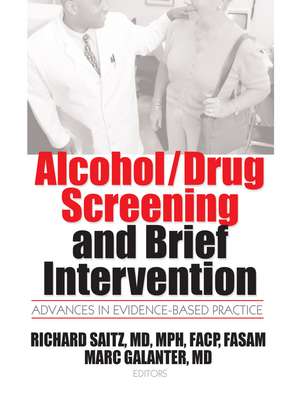Alcohol/Drug Screening and Brief Intervention: Advances in Evidence-Based Practice
Autor Mark Galanter, Richard Saitzen Limba Engleză Paperback – 29 feb 2008
Screening and brief intervention (SBI) has been around for over 40 years and is a widely recognized practice. Alcohol/Drug Screening and Brief Intervention: Advances in Evidence-Based Practice provides a valuable exploration of the present literature, the effectiveness and cost-effectiveness of screening and brief intervention, and methodological challenges in studying these practices. Respected leaders in the field discuss ways to measure the use of screening and brief intervention in practice, the multiple risk factor context in which unhealthy alcohol use occurs, clinician training issues, effective strategies to screen adolescents, which patients are most likely to change from SBI, and what research is needed in the future.
Screening and brief intervention are presently being used in numerous settings such as hospitals, primary care settings, trauma centers, and college health services. Alcohol/Drug Screening and Brief Intervention: Advances in Evidence-Based Practice examines in detail original research and cutting edge research issues in these settings to provide an important review of what is known and what is not known about the practice. Methodological issues are extensively discussed. This valuable book provides crucial information on the detection of small effects, standards of analysis, reporting, interpretation, the risks of bias, and the need to ensure that results have the potential to be applied in practice. Health professionals and addiction specialists get an important critical re-evaluation of the growing practice and are provided direction for future research.
Other topics in Alcohol/Drug Screening and Brief Intervention: Advances in Evidence-Based Practice include:
- results of research on screening, brief intervention, and referral to treatment (SBIRT)
- exploration of data assessing the effectiveness of screening and brief alcohol intervention
- evaluation of clinical alcohol screening with the AUDIT-C
- cost-effectiveness and cost-benefit of SBI in medical settings
- research into SBIRT for Emergency Departments
- data on primary care patients with multiple risk factors
- research on feasibility and efficacy of “no-contact” interventions
- and more!
Preț: 338.37 lei
Preț vechi: 356.18 lei
-5% Nou
Puncte Express: 508
Preț estimativ în valută:
64.75€ • 70.55$ • 54.56£
64.75€ • 70.55$ • 54.56£
Carte tipărită la comandă
Livrare economică 23 aprilie-07 mai
Preluare comenzi: 021 569.72.76
Specificații
ISBN-13: 9780789037497
ISBN-10: 0789037491
Pagini: 170
Ilustrații: black & white tables, figures
Dimensiuni: 219 x 276 x 12 mm
Greutate: 0.45 kg
Ediția:1
Editura: Taylor & Francis
Colecția CRC Press
Locul publicării:Oxford, United Kingdom
ISBN-10: 0789037491
Pagini: 170
Ilustrații: black & white tables, figures
Dimensiuni: 219 x 276 x 12 mm
Greutate: 0.45 kg
Ediția:1
Editura: Taylor & Francis
Colecția CRC Press
Locul publicării:Oxford, United Kingdom
Public țintă
ProfessionalCuprins
1. Overview 2. Assessment: How it Works 3. Examples of Where it has been Applied
Descriere
Screening and brief intervention (SBI) has been around for over 40 years and is a widely recognized practice. Alcohol/Drug Screening and Brief Intervention: Advances in Evidence-Based Practice provides a valuable exploration of the present literature, the effectiveness and cost-effectiveness of screening and brief intervention, and methodological challenges in studying these practices. Respected leaders in the field discuss ways to measure the use of screening and brief intervention in practice, the multiple risk factor context in which unhealthy alcohol use occurs, clinician training issues, effective strategies to screen adolescents, which patients are most likely to change from SBI, and what research is needed in the future.






